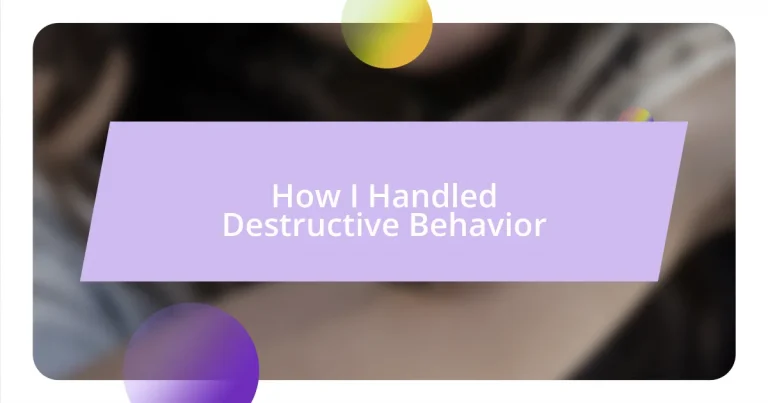Key takeaways:
- Destructive behavior often reflects underlying emotional struggles, emphasizing the need for empathy and understanding when addressing such actions.
- Recognizing triggers such as emotional distress and environmental stressors can lead to more compassionate support and effective interventions.
- Developing coping strategies like journaling, exercise, and seeking social support, along with professional help when necessary, is essential for maintaining progress and promoting personal growth.
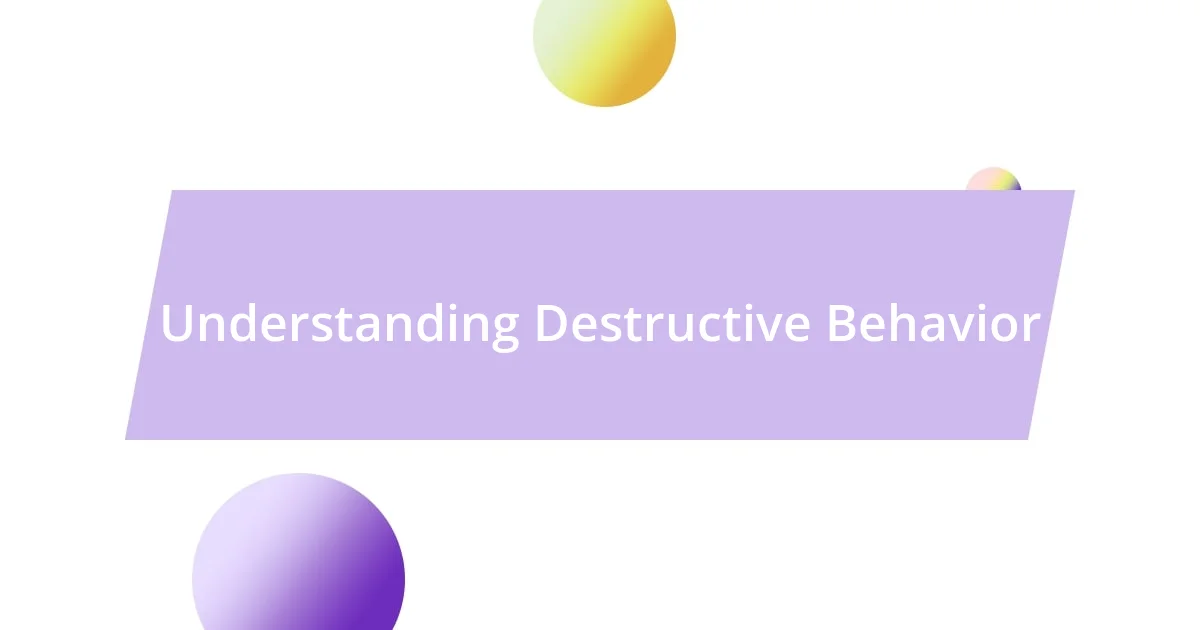
Understanding Destructive Behavior
Understanding destructive behavior often starts with recognizing its roots. From my perspective, it can stem from various factors, such as emotional distress, environmental influences, or unresolved problems. Have you ever noticed someone acting out because of stress or sadness? It’s a powerful reminder that behavior often communicates a deeper struggle.
I remember a time when a close friend became incredibly withdrawn. At first, I thought it was just a phase, but I soon realized this behavior masked a significant turmoil. She was facing family issues that she felt she couldn’t discuss. This experience taught me that destructive actions often reflect an inner battle, one that needs compassion and understanding rather than judgment.
Reflecting on my encounters, I’ve come to see destructive behavior as a cry for help. Much like the stormy weather that disrupts a serene landscape, these actions disrupt not just the individual’s life but also their relationships and surroundings. When we pause to consider the situation, asking ourselves, “What’s really going on here?” we open the door to empathy, paving the way for healing and support.
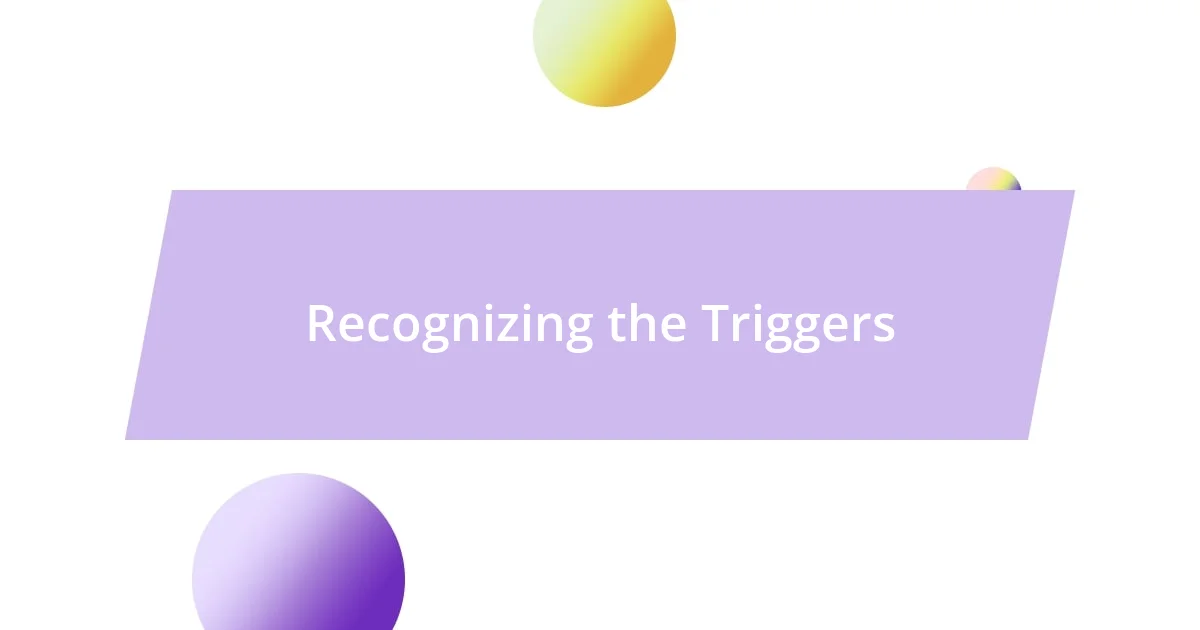
Recognizing the Triggers
Recognizing the triggers behind destructive behavior can be a game changer in offering support. From my experience, I’ve found that certain situations or feelings often act as catalysts for these actions. For example, when I was working with teens struggling with anger, I noticed that many would lash out during high-pressure times, like exams or after a conflict with friends. It got me thinking about how often we overlook the underlying stressors affecting our reactions.
Here are some common triggers that I’ve identified:
- Emotional distress: Feelings of sadness, frustration, or anxiety can often lead to destructive behavior as a way to express inner turmoil.
- Environmental stressors: Situations at home, school, or work—a difficult family dynamic or an unkind peer—can spark negative actions.
- Unresolved conflicts: Past traumas or ongoing disputes can manifest in destructive behavior if not addressed.
- Social pressures: Wanting to fit in or react to peer dynamics can lead to impulsive actions that damage relationships.
Recognizing these indicators helps us not just understand the behavior better but also approach individuals with a more compassionate mindset. It’s a process that takes time but can lead to a healthier, more supportive environment.
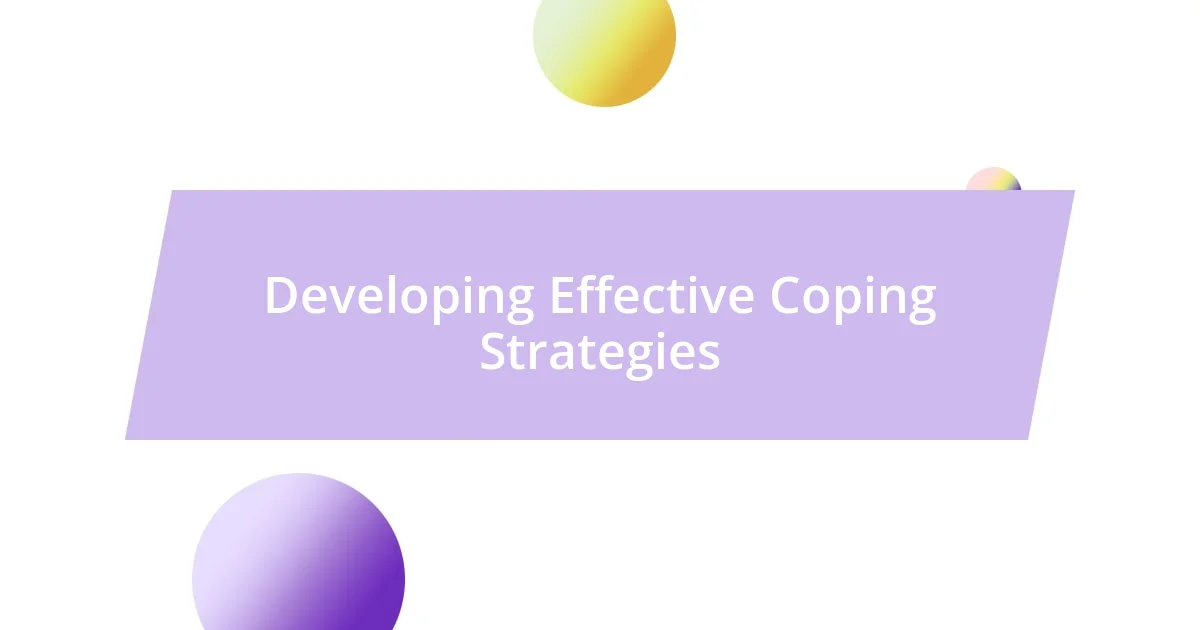
Developing Effective Coping Strategies
Developing effective coping strategies is essential when addressing destructive behavior. In my experiences, I’ve learned that coping mechanisms can vary widely depending on the individual. For instance, during a particularly tough period in my life, I discovered that journaling became a lifeline. Writing down my thoughts and feelings not only clarified my emotions but also provided a safe space to process the chaos swirling around me. Have you ever tried putting your feelings on paper? It can be incredibly liberating and enlightening.
Additionally, engaging in physical activities like exercise has been a powerful way to cope. I recall a time when I felt overwhelmed and decided to go for a long run. As I pushed through the discomfort, I felt my worries start to dissipate. The endorphins released during physical activity can truly make a difference. Finding healthy outlets for stress is not only beneficial, it’s transformative.
Lastly, seeking social support can make a world of difference. I vividly remember reaching out to a friend after a particularly challenging day. Just talking and sharing our experiences helped alleviate my burdens. It reminded me that we all need connections to lean on, especially during tough times. Effective coping strategies are often about finding what works for you—be it creative outlets, physical exercise, or the comfort of camaraderie.
| Coping Strategy | Description |
|---|---|
| Journaling | Writing down thoughts to clarify emotions and process feelings. |
| Exercise | Engaging in physical activity to relieve stress and boost mood. |
| Social Support | Reaching out to friends or family for shared experiences and emotional relief. |
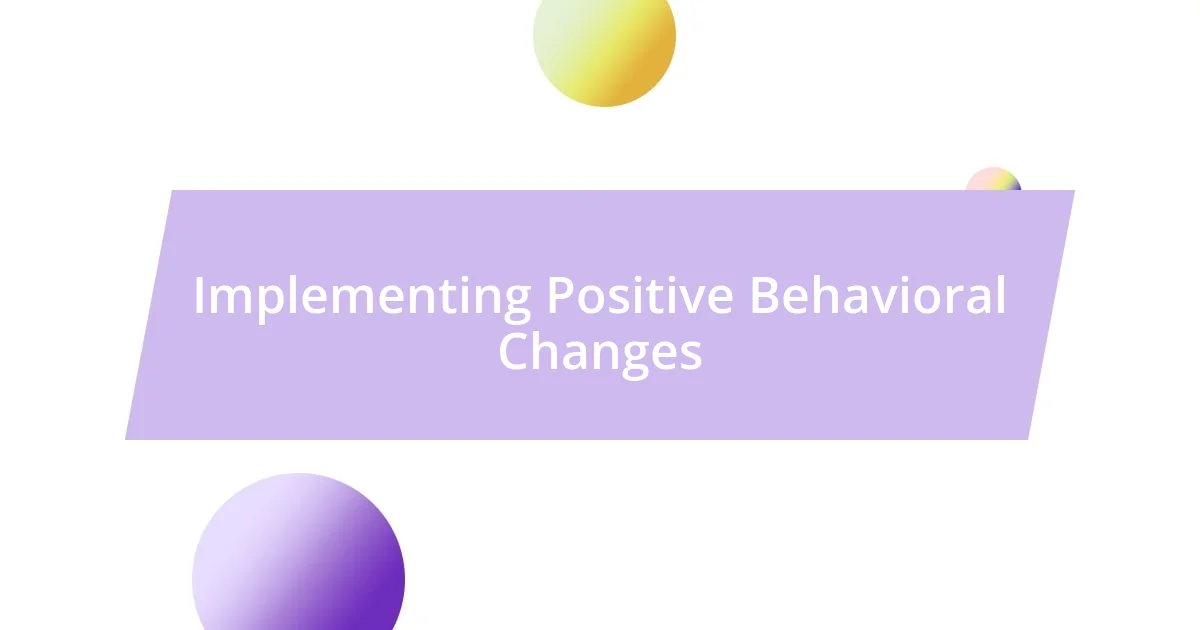
Implementing Positive Behavioral Changes
Implementing positive behavioral changes often starts with establishing clear expectations. I remember a time when I was mentoring a group of young adults; setting specific goals for behavior helped them focus on what they wanted to achieve. Instead of simply telling them to “be better,” we crafted personalized action plans that outlined practical steps they could take. Have you ever had a moment where clarity transformed your approach to a challenge? It made all the difference for us.
Creating a supportive environment is crucial as well. I once volunteered in a community program where we encouraged peers to celebrate each other’s successes, no matter how small. This sense of camaraderie fostered an atmosphere where people felt safe to share their victories and struggles. It’s fascinating how acknowledging progress, even just a step forward, can motivate individuals to continue striving for positive change. Don’t you agree that recognition can sometimes spark the desire to improve even more?
Lastly, consistency in reinforcing positive behaviors can’t be overstated. When I coached a youth basketball team, I focused on positive reinforcement for teamwork and sportsmanship. I made it a point to highlight every instance where a player chose to support a teammate rather than seek individual glory. Seeing their reactions brightened the atmosphere. I often wonder how different our interactions might be if we all focused on reinforcing the good in each other, rather than just pointing out the flaws. It’s that ongoing encouragement that really fosters growth and transformation.

Seeking Professional Help When Needed
In my journey, there have been moments when it became clear that professional help was essential. I remember feeling overwhelmed during a particularly stressful period, and after some soul-searching, I reached out to a therapist. That first session was a revelation; it was like finally having a map in a dense fog. Have you ever felt that instant connection with someone who truly understood your struggles?
Professional guidance can serve as a grounding force when dealing with destructive behavior. On one occasion, I attended a workshop led by a mental health expert, and their insights opened my eyes to patterns I wasn’t even aware I had. I realized then that addressing such behaviors often requires more than just willpower—it takes skillful navigation through emotional landscapes. How comforting is it to know that there are trained professionals ready to guide you through these tumultuous times?
Ultimately, seeking help doesn’t have to feel intimidating; it can be empowering. I’ll never forget the moment I recognized that asking for assistance was a sign of strength, not weakness. It shifted my perspective entirely. If you find yourself struggling, I urge you to consider that reaching out could be the very step you need to reclaim your life.
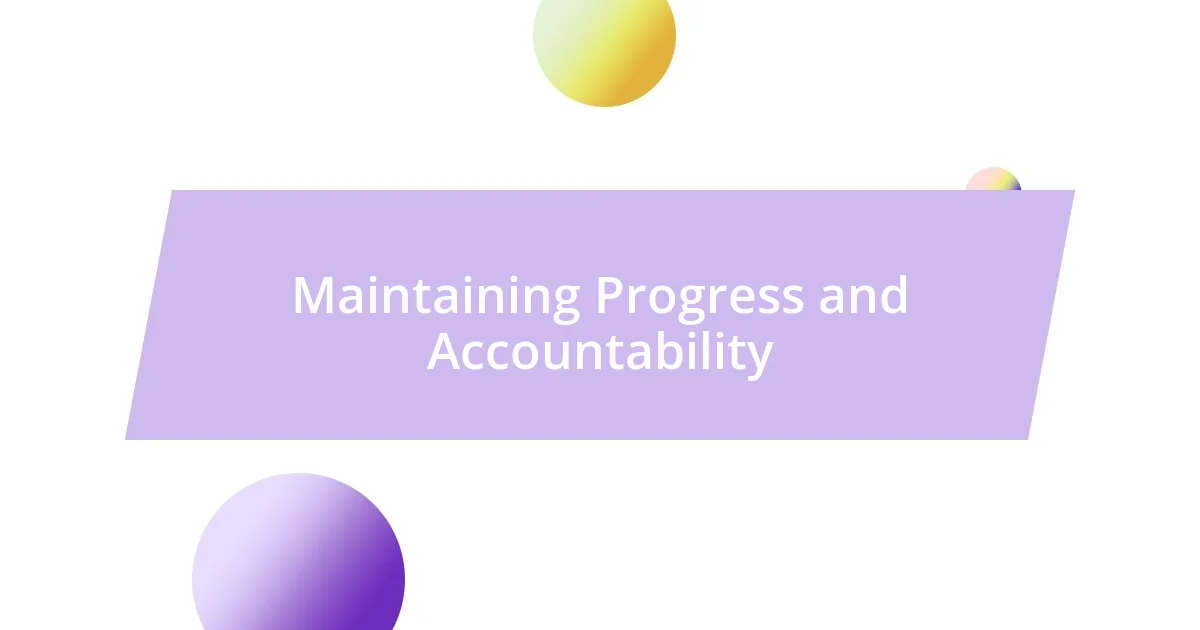
Maintaining Progress and Accountability
Maintaining progress and accountability is an ongoing journey, and I’ve found that regular check-ins are invaluable. I remember setting up weekly meetings with a group I was part of where we openly discussed our challenges and accomplishments. It felt like a safe space, almost like a support group, and those conversations held us accountable while allowing us to learn from one another. Isn’t it interesting how sharing our stories can motivate us to keep going?
Another key aspect is tracking our progress meticulously. When I took on a personal project to improve my health, I kept a daily journal of my habits. On tough days, flipping back through those entries reminded me of how far I’d come. It raised a question for me: what if we all maintained some form of record to celebrate our victories, no matter how small? The act of chronicling progress can re-energize our commitment.
Finally, I believe in the power of accountability partners. I paired up with a friend for a time management challenge, and we held each other to our commitments. It was more than just checking off boxes; we discussed our thought processes and celebrated our wins together. Have you ever had someone in your corner who pushed you to be your best self? That mutual support transformed our goals into shared missions, reinforcing the importance of having someone to lift you up when you need it.
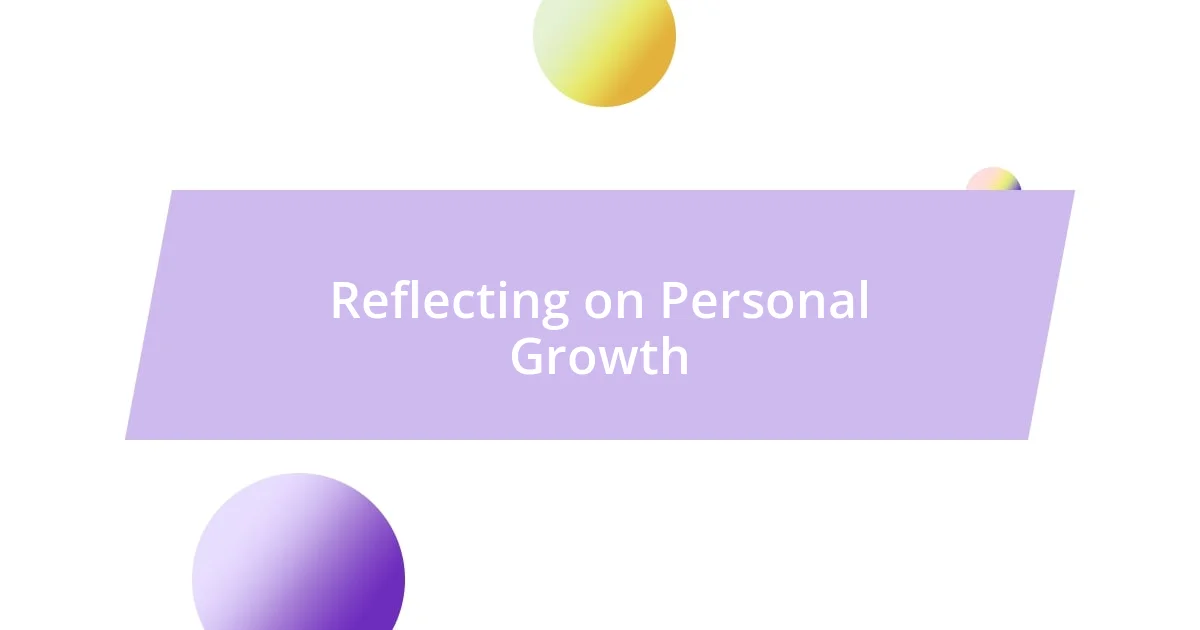
Reflecting on Personal Growth
Reflecting on personal growth can sometimes feel like looking back at a distant landscape, no longer familiar yet profoundly impactful. I distinctly remember a moment when I stumbled upon an old journal entry where I ranted about my struggles with destructive habits. Reading those words felt like peering into a time capsule; it was a stark reminder of how far I had come. Have you ever had one of those moments that made you realize just how much you’ve changed?
As I continued to reflect, I discovered that growth often comes in waves. After experiencing setbacks, I learned the importance of self-forgiveness. I remember sitting quietly, grappling with a particularly rough patch, and acknowledging that it was okay to falter. That realization brought a wave of relief. Isn’t it liberating to accept that growth isn’t a straight path but a journey with peaks and valleys?
Through these reflections, I found clarity in my values. I often think back to how easily I was swayed by external opinions. Now, I can proudly say that I’m more grounded in my beliefs and priorities. I recall a conversation with a mentor who challenged my perspective and encouraged me to explore what truly mattered to me. Have you ever experienced a conversation that shifted your thinking entirely? Understanding my core values has become a beacon guiding my decisions, making each step feel more intentional and aligned with who I am becoming.












